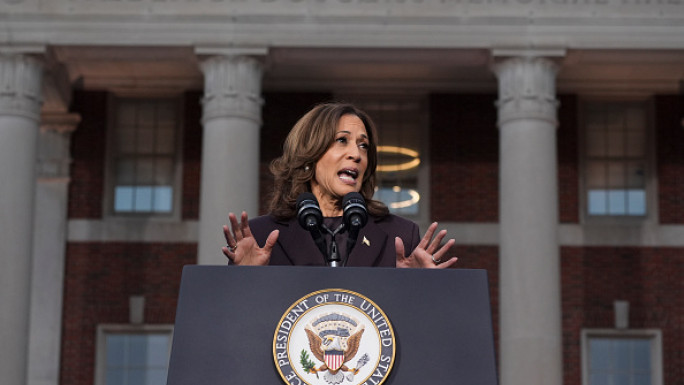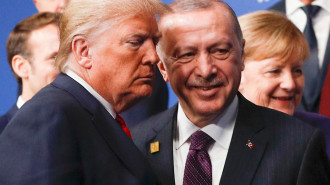World Bank, IMF say Sudan eligible for debt relief after US deal
The United States confirmed on Friday that it has assisted Sudan with more than $1 billion to help clear arrears at the World Bank as it hailed reforms by the civilian-backed government.
Following the announcement, the Washington-based development lender and the IMF said in a joint statement that Sudan could now be eligible for relief on its nearly $50 billion in external debt under the Enhanced Heavily Indebted Poor Countries program.
"This is a breakthrough at a time when Sudan needs the world's help to support its development progress," World Bank President David Malpass said.
"The steps taken so far, including arrears clearance and exchange rate unification, will put Sudan on the path to substantial debt relief, economic revival and inclusive development."
US President Joe Biden's administration said it carried out a financing deal signed in January by the previous treasury secretary, Steven Mnuchin, during a trip to Sudan, which has faced unrest over the past several years due to the dire economic situation.
The Treasury Department on Thursday provided Khartoum with $1.15 billion in bridge financing, typically loans that cover short-term needs. No US taxpayer money was involved.
"Sudan's civilian-led transitional government deserves credit for making challenging but necessary reforms to restore its social contract with the Sudanese people," said Treasury Secretary Janet Yellen, Mnuchin's successor.
Prime Minister Abdalla Hamdok, a British-educated economist, has been seeking ways to end conflicts and rebuild economic opportunities as Sudan turns the page on decades of pariah status under strongman Omar al-Bashir, who was toppled in April 2019.
Twitter Post
|
In the final months of Donald Trump's administration, the United States removed Sudan from a list of state sponsors of terrorism, a long-sought goal of Khartoum as the designation severely impeded investment.
Controversial Israel normalisation
Trump agreed to the move after pushing Sudan to agree to normalise ties with US ally Israel, a decision that has triggered protests in Khartoum.
Earlier this month, fourteen political movements and parties in Sudan called on the country's normalisation process with Israel to be halted until general elections are held.
The signatories of the statement stressed that continuing with the normalisation agreement would expose the Sudanese transitional government to further divisions at a sensitive point in the country's history.
The group said they recognise the complexities Sudan faces during its path to democracy but that the country must not give up on its insistence on a two-state solution to the Palestine-Israel conflict.
"It [Sudan] is heading towards a solid democratic transformation, full transparency and liquidation of the legacy of the worst fascist regimes in its history, and the transitional period faces many pitfalls and difficulties," said the statement.
"Sudan's principled position based on the United Nations Charter and the decisions of its General Assembly and on the humanitarian position on the right of peoples to their freedom, independence and sovereignty over their lands, and adherence to the legitimacy and right of the Palestinian people to establish their independent state with Jerusalem as its capital."
The statement said that no single party has the right to shift Sudan's position on this matter "and it is not within the jurisdiction of the institutions of the transitional period".
The signatories indicated that a decision to normalise relations must be taken by an elected legislative body and not the transitional government, which is still beholden to conditions set by the previous regime.
Read more: How US blackmail pushed Sudan to normalise ties with Israel
A premature normalisation of relations with Israel would open the door to a new dictatorship that excluded people from decision making, it said.
The statement was signed by the Nationalist Baath Party, the Arab Socialist Baath Party, the Sudanese Front for Change, the Free Student Movement, the Free Mass Movement, the Nasserite Democratic Unionist Party, the Free Federal Movement, and the Alliance of Sudanese Women Politicians.
Sudan followed the UAE and Bahrain in signing a normalisation agreement with Israel in October 2020.
Agencies contributed to this report.
Follow us on Facebook, Twitter and Instagram to stay connected
![Hamdok [Anadolu] Hamdok [Anadolu]](/sites/default/files/styles/large_16_9/public/media/images/FC7D26F3-7CF6-4EEF-9A80-58AAD1098420.png?h=d1cb525d&itok=etNqYX_e)

![President Pezeshkian has denounced Israel's attacks on Lebanon [Getty]](/sites/default/files/styles/image_684x385/public/2173482924.jpeg?h=a5f2f23a&itok=q3evVtko)



 Follow the Middle East's top stories in English at The New Arab on Google News
Follow the Middle East's top stories in English at The New Arab on Google News


